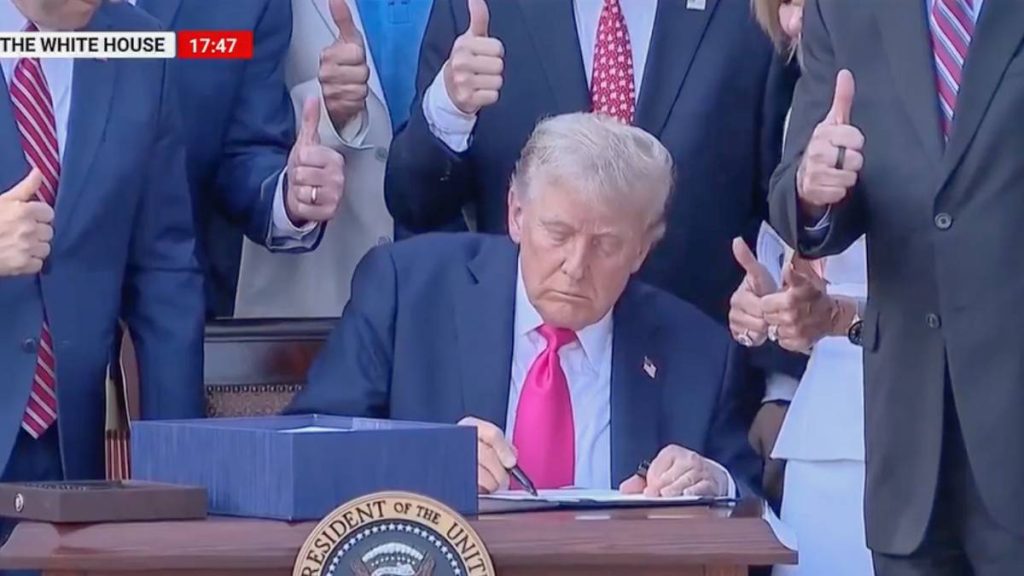UHERO Forecast: Federal cuts to social safety net will affect tens of thousands of people in Hawaiʻi
On July 4, President Donald Trump signed into law the Fiscal Year 2025 Reconciliation Act also known as the One Big Beautiful Bill Act, which will negatively affect tens of thousands of people who rely on social safety net programs in Hawaiʻi, according to the third quarter forecast of the University of Hawaiʻi Economic Research Organization.

The bill includes cutting federal Medicaid and Affordable Care Act marketplace healthcare insurance funding by an estimated $1.1 trillion and Supplemental Nutrition Assistance Program funding by $187 billion over fiscal years 2025 to 2034.
The Congressional Budget Office estimated that the new law would lead to 10 million Americans losing health insurance by 2034 and 2.4 million losing SNAP benefits.
This will affect many people i Hawaiʻi, where more than 400,000 residents participate in Medicaid, more than 160,000 receive SNAP benefits, and 43,000 households receive both
“These changes could impact a large segment of the population, with potential ripple effects across the state’s economy,” the report said. “The law tightens eligibility and enrollment procedures for safety net programs, restricts benefit growth, increases the share of benefits paid by states, and adds red tape for both states and beneficiaries.”
The Kaiser Family Foundation projects that 41,000 Hawaiʻi residents will lose Medicaid benefits due to the One Big Beautiful Bill Act.
For Hawaiʻi’s SNAP recipients, the Center on Budget and Policy Priorities estimated that 22,000 people in households with school-aged children and 8,000 in households with no children could lose some benefits.

The most consequential changes are the expansion of work requirements and increased verification frequency. Starting in January 2027, Medicaid recipients made eligible through the Affordable Care Act must reapply every 6 months with documentation of at least 80 hours per month of work, school or work-related activities (such as job training and volunteer service) in the previous month.
Because the majority of able-bodied adult recipients already work, most of these losses result from eligible adults being tripped up by red tape and improperly denied, or due to job
instability, as described below.
For SNAP recipients, an existing 80-hour-per-month work requirement now applies to an expanded group of Able-Bodied Adults Without Dependents, increasing the age range from 18–49 to 18–64 years old, as well as adults with dependent children 14 and older.
Hawaii’s state agencies responsible for administering these programs can request delayed implementation of work requirements until January 2029. These extensions are at the discretion of cabinet secretaries, and therefore uncertain, but hold out some possibility that
Congress may reverse course before Hawaii is affected, the UHERO forecast said.
While the stated goal of these provisions is to encourage workforce participation and reduce program dependency, research has consistently found that work requirements do not increase employment, including research by the Hamilton Project.
In practice, even working recipients may lose coverage due to complicated reporting rules, unstable employment, or a lack of paid sick leave.
A Brookings Institution analysis shows that low-wage, service-sector jobs are often unstable: 64% of service industry employees worked fewer than 80 hours in at least one month out of the year, and 65% of low-income workers with irregular schedules report that fluctuations were determined by employers, not employees.
These new requirements for safety net programs are likely to disproportionately affect Hawaii given the state’s large concentration of low-wage, service-sector jobs. Moreover, cuts to Medicaid and SNAP benefits under the One Big Beautiful Bill Act could produce economic ripple effects, the UHERO forecast said.
Reduced access to Medicaid would lead to poorer health outcomes and increased reliance on emergency care, and strain the finances of healthcare providers serving newly uninsured patients.
The loss of SNAP benefits would also cause households to tighten their belts, reducing demand for groceries and other local goods and services. Nonprofits and government agencies may face new pressures as more residents turn to them for assistance, the UHERO forecast said.



